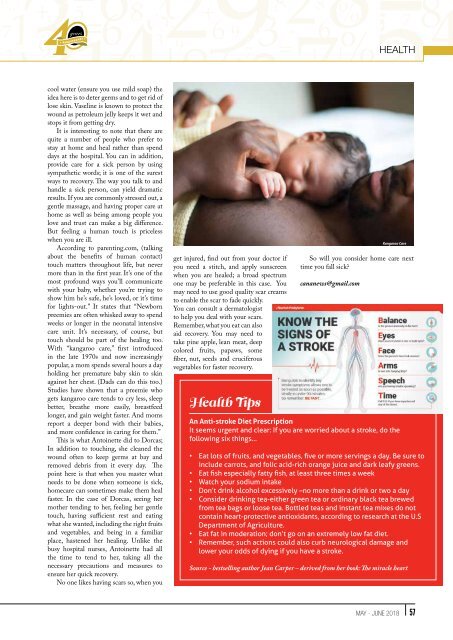May-June-issue
Create successful ePaper yourself
Turn your PDF publications into a flip-book with our unique Google optimized e-Paper software.
HEALTH<br />
cool water (ensure you use mild soap) the<br />
idea here is to deter germs and to get rid of<br />
lose skin. Vaseline is known to protect the<br />
wound as petroleum jelly keeps it wet and<br />
stops it from getting dry.<br />
It is interesting to note that there are<br />
quite a number of people who prefer to<br />
stay at home and heal rather than spend<br />
days at the hospital. You can in addition,<br />
provide care for a sick person by using<br />
sympathetic words; it is one of the surest<br />
ways to recovery. The way you talk to and<br />
handle a sick person, can yield dramatic<br />
results. If you are commonly stressed out, a<br />
gentle massage, and having proper care at<br />
home as well as being among people you<br />
love and trust can make a big difference.<br />
But feeling a human touch is priceless<br />
when you are ill.<br />
According to parenting.com, (talking<br />
about the benefits of human contact)<br />
touch matters throughout life, but never<br />
more than in the first year. It’s one of the<br />
most profound ways you’ll communicate<br />
with your baby, whether you’re trying to<br />
show him he’s safe, he’s loved, or it’s time<br />
for lights-out.” It states that “Newborn<br />
preemies are often whisked away to spend<br />
weeks or longer in the neonatal intensive<br />
care unit. It’s necessary, of course, but<br />
touch should be part of the healing too.<br />
With “kangaroo care,” first introduced<br />
in the late 1970s and now increasingly<br />
popular, a mom spends several hours a day<br />
holding her premature baby skin to skin<br />
against her chest. (Dads can do this too.)<br />
Studies have shown that a preemie who<br />
gets kangaroo care tends to cry less, sleep<br />
better, breathe more easily, breastfeed<br />
longer, and gain weight faster. And moms<br />
report a deeper bond with their babies,<br />
and more confidence in caring for them.”<br />
This is what Antoinette did to Dorcas;<br />
In addition to touching, she cleaned the<br />
wound often to keep germs at bay and<br />
removed debris from it every day. The<br />
point here is that when you master what<br />
needs to be done when someone is sick,<br />
homecare can sometimes make them heal<br />
faster. In the case of Dorcas, seeing her<br />
mother tending to her, feeling her gentle<br />
touch, having sufficient rest and eating<br />
what she wanted, including the right fruits<br />
and vegetables, and being in a familiar<br />
place, hastened her healing. Unlike the<br />
busy hospital nurses, Antoinette had all<br />
the time to tend to her, taking all the<br />
necessary precautions and measures to<br />
ensure her quick recovery.<br />
No one likes having scars so, when you<br />
get injured, find out from your doctor if<br />
you need a stitch, and apply sunscreen<br />
when you are healed; a broad spectrum<br />
one may be preferable in this case. You<br />
may need to use good quality scar creams<br />
to enable the scar to fade quickly.<br />
You can consult a dermatologist<br />
to help you deal with your scars.<br />
Remember, what you eat can also<br />
aid recovery. You may need to<br />
take pine apple, lean meat, deep<br />
colored fruits, papaws, some<br />
fiber, nut, seeds and cruciferous<br />
vegetables for faster recovery.<br />
Health Tips<br />
So will you consider home care next<br />
time you fall sick?<br />
cananews@gmail.com<br />
Kangaroo Care<br />
An Anti-stroke Diet Prescription<br />
It seems urgent and clear: If you are worried about a stroke, do the<br />
following six things…<br />
• Eat lots of fruits, and vegetables, five or more servings a day. Be sure to<br />
include carrots, and folic acid-rich orange juice and dark leafy greens.<br />
• Eat fish especially fatty fish, at least three times a week<br />
• Watch your sodium intake<br />
• Don’t drink alcohol excessively –no more than a drink or two a day<br />
• Consider drinking tea-either green tea or ordinary black tea brewed<br />
from tea bags or loose tea. Bottled teas and instant tea mixes do not<br />
contain heart-protective antioxidants, according to research at the U.S<br />
Department of Agriculture.<br />
• Eat fat in moderation; don’t go on an extremely low fat diet.<br />
• Remember, such actions could also curb neurological damage and<br />
lower your odds of dying if you have a stroke.<br />
Source - bestselling author Jean Carper – derived from her book: The miracle heart<br />
MAY - JUNE 2018 57

















